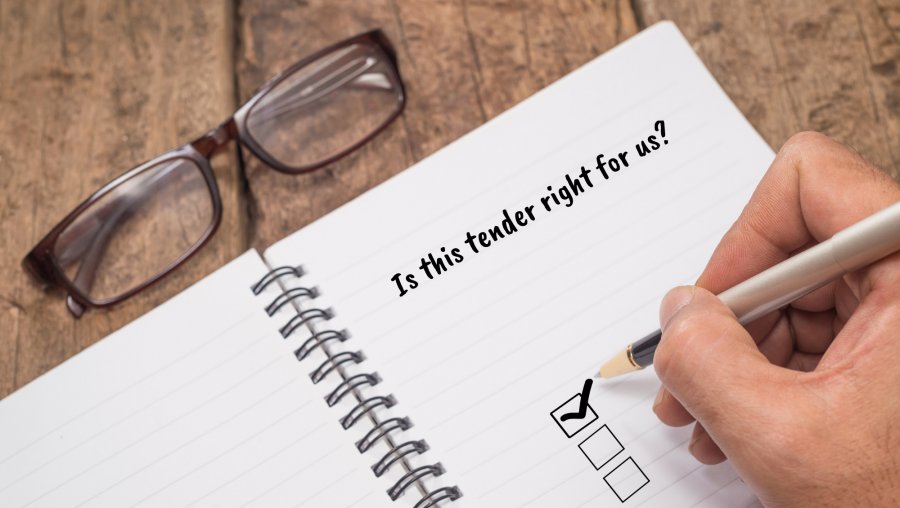Finding the perfect tender for your business
There are thousands of open tenders in the UK at any one time, a quick search of either of the two main databases – Find a Tender and Contracts Finder – will show just how many there are. Both databases can be searched using keywords, so you can search for tenders relevant to your business; but even then, the number of tenders returned using a keyword search can be huge, so how do you narrow the field down to that one key tender that fits your business perfectly and gives you a good chance of winning?
Ensure you understand your requirements
Firstly, before you even start searching, determine what would comprise your ideal tender. Make a list of all the things your ideal tender would contain. If your business provides multiple services/products, do this for each service/product. This will really help you narrow down what it is you’re looking for and will help you analyse real tenders as you’ll be able to compare them against your ideal.
Having understood what would comprise your ideal tender, it should be fairly straightforward to put together a list of specific keywords to use to search the databases.
Your database search using those keywords may return one tender, it may return ten, or it may return many more. When you have that list, what do you look for to determine if it’s a good fit for your business?
Location
If you supply goods and/or services nationwide, then location isn’t necessarily of importance. But if you can only supply fairly locally, you can discount any tenders for locations outside of your area. Additionally, being local can put you at a real advantage if you can demonstrate a unique understanding of the needs and/or challenges of the local community in your tender response.
Value
If you’re a small business, with a relatively low turnover, trying to win a £multi-million tender straight out is unlikely to be a fruitful pursuit. Be realistic about the value of the tender you may be able to win. Some tenders state a minimum turnover in the requirements; some require that the income from the contract will not be more than a certain percentage of your turnover. Not all tenders publish a contract value, so you may have to dig deeper and look at exactly what they’re specifying to work out the value from your approximate bid price.
Timescales
When is the tender response due? Crafting a winning bid is time consuming, so if the deadline is only a week away, you’re going to be under pressure and your bid may not be as good as it could be. Choosing a tender where you have enough time to pull together your response properly and can go through a revision and edit process will help ensure your bid is the best it can be.
Framework vs Direct Contract
Getting appointed onto a Framework may be easier than winning a direct contract if you are just starting out. It can help you gain valuable experience and use the credentials of being a ‘framework approved supplier’ to attract other business. However, as no income is guaranteed if you are appointed, you may wish to focus your efforts on winning a direct contract outright. If possible, try to calculate the likely revenue each venture will bring over the long-term and the likelihood of success. This is a key area where an expert like Complete Tenders can really help.
What assessment weighting is being used?
Tenders are assessed according to the principles of MEAT – Most Economically Advantageous Tender – and will have a ratio (or weighting) of quality vs price. For example, a tender could be assessed as 80% on quality and 20% on price, or vice versa, or any other ratio, including 100% on quality or 100% on price. If you know that your prices generally come in higher than your competitors, then bidding on a tender with a large weighting on price won’t be in your favour. Where there is a better ratio between quality and price, and your higher quality can outweigh your competitors’ lower prices, then this is the tender for you.
How much work is involved in creating a response?
Does the tender simply involve answering some standard questions about your business or are there more complicated method statements to be written? Do you have any previous material you can use to help you answer the questions and build on these to make them stronger and more relevant to this buyer? If the questions are complex and plentiful and you are new to tendering, consider whether this is the best use of your time or whether you should look for an ‘easier’ tender. That said, time and effort spent on preparing any tender makes the next one a little easier.
Do you have all the documents required?
Some tenders require the submission of extra documentation such as policies and procedures. Do you already have all the documentation required? Would you need to create any? It may be more appropriate to leave the tender this time, and work on creating the documentation so you have it ready for the next time.
Pricing schedule
How complicated is the pricing schedule and how much work is involved in completing it? Do you have experience completing similar pricing schedules? Are you able to review it to calculate the total value and the margin you would make? The pricing model will play a large part in deciding whether you can make money from the contract or not – ultimately if you’re not making any money from it, its not worth bidding for.
Terms and conditions
Is there anything in the terms and conditions that would affect your decision to bid? Are you able to confer with a legal support about getting into such a contract?
Does the specification match your business?
The above should have narrowed your search results significantly, so now you’re going to need to read the tender specification in detail to understand exactly what the buyer is looking for and determine whether you can deliver all that is being asked. Consider whether you can demonstrate previous experience and provide evidence to back up your bid.
Get expert help
If all this sounds daunting, help is out there. Complete Tenders provides a personal tender tracking service that does all the hard work for you. Our specialist team will shortlist only those tenders that are a good fit for your business using years of experience in winning contracts. We will help you make informed decisions to bid to ensure you get a successful return on your tendering investment.
Alternatively call us now to see how we can help you tender more effectively on 01707 244713.




